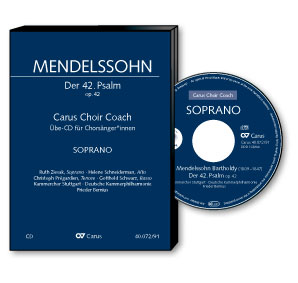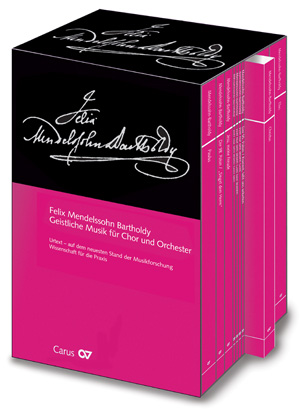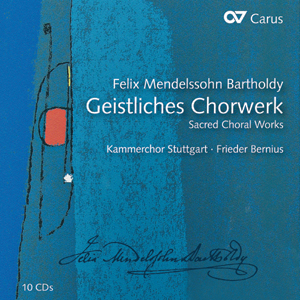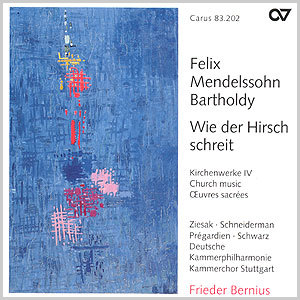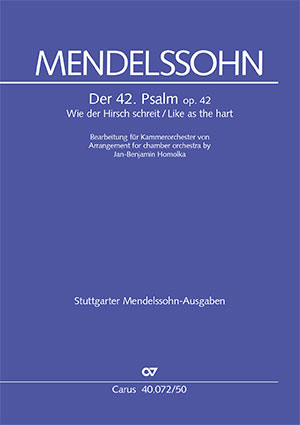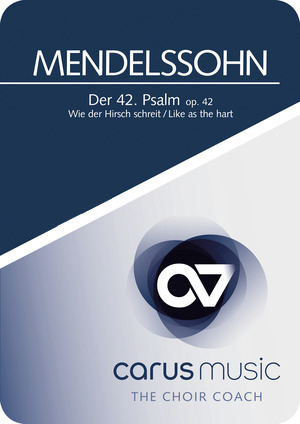
In 1837 Robert Schumann judged Mendelssohn’s Psalm 42 Wie der Hirsch schreit (Like as the hart) as the “highest standard which has been achieved amongst recent church music”. This work is truly a favorite of many choirs, however, the final chorus contains a few tricky problem passages: in particular, the wonderful quintet requires perfect intonation from the four male voices to provide a secure basis over which the bell-like clarity of the solo soprano floats ...
Simply practice. Anytime. Everywhere.
Whether at home on your tablet or PC or on the road on your smartphone: with carus music, the Choir Coach, you always have your choral works with you to practice! With the carus music choir app, you can listen to your score together with a first-class recording on any device and easily practice your own choir part with a coach. With carus music, your concert preparation is easy, efficient and fun to master!
Performers: Ruth Ziesak (soprano), Jan Kobow, Christoph Prégardien (tenore), Gotthold Schwarz, Adolph Seidel (basso) – Kammerchor Stuttgart, Deutsche Kammerphilharmonie Bremen – Frieder Bernius
Contents
-
Composer
Felix Mendelssohn Bartholdy
| 1809-1847
-
Choir
Kammerchor Stuttgart
The Kammerchor Stuttgart is regarded as one of the best ensembles of its kind. Over its fifty-year existence, Frieder Bernius has developed the choir into an exceptional ensemble acclaimed by audiences and press alike. This has led to invitations for the choir to perform at all the important European festivals. In Germany the chamber choir performs at festivals and in concert halls in repertoire ranging from the 17th to the 21st century. Frieder Bernius and his ensemble have received numerous accolades for their contribution to new music. The Kammerchor Stuttgart has made over 80 CDs and LPs, numerous of which have been awarded international recording prizes (including the Edison award, Diapason d’or, Gramophone Choice, Classical Internet Award, International Classical Music Award, and German Record Critics’ Award prizes). The International Federation for Choral Music has invited the ensemble to sing at the 1st, 4th and 10th World Symposia on Choral Music in Vienna, Sydney and Seoul. Regular tours of North America and Asia since 1988 and a South America tour reflect the Kammerchor Stuttgart’s international reputation. Since 1984 the top ensemble has also been invited to Israel biennially. Personal details
-
Ensemble
Deutsche Kammerphilharmonie Bremen
-
Conductor
Frieder Bernius
| 1947Frieder Bernius’s work has earned great worldwide recognition. He is in demand internationally as a conductor and as a teacher. His principal artistic collaborators are the ensembles he founded himself, the Kammerchor Stuttgart, the Barockorchester Stuttgart, the Hofkapelle Stuttgart and the Klassische Philharmonie Stuttgart. As a guest conductor, he has collaborated repeatedly with, for example, the SWR Vokalensemble Stuttgart, the Deutsche Kammerphilharmonie Bremen, the Stuttgarter Kammerorchester and the Streicherakademie Bozen. Great stylistic versatility is Frieder Bernius’s hallmark. Whether he conducts vocal works by Monteverdi, Bach, Händel, Mozart, Beethoven, Fauré and Ligeti, stage music by Mendelssohn or symphonies by Haydn, Burgmüller and Schubert, his work always aims for a sound that is at once unmistakably personal and at the same time oriented towards the original period sound ideal. He devotes himself equally to the rediscovery of 18th century operas and to first performances of contemporary compositions. He is particularly interested in the musical history of southwestern Germany. Carus-Verlag has awarded Frieder Bernius a Golden CD for his complete recording of the sacred music of Felix Mendelssohn Bartholdy. The award was presented to him during the German Choir Festival in Stuttgart 2016. The sale of over 250,000 recordings, which has been acclaimed with a number of awards, has made a not insignificant contribution to what today is the obvious presence of Mendelssohn's complete œuvre in the concert repertoire. Personal details
-
Soloist - soprano
Ruth Ziesak
-
Soloist - alto
Helene Schneiderman
-
Soloist - tenor
Christoph Prégardien
As one of the outstanding lyric tenors of today, Christoph Pregardien is highly regarded as a lieder singer. He specializes in lieder and oratorio and his repertoire encompasses all periods. Christoph Pregardien and his accompanist Michael Gees received the MIDEM Classical Award 2009 for their recording of Schubert’s “Die schone Mullerin”. Personal details
-
Soloist - bass
Gotthold Schwarz
Gotthold Schwarz received his first musical training at the Dresden Kirchenmusikschule and at the Hochschule für Musik Felix Mendelssohn Bartholdy in Leipzig. This bass studied singing with Gerda Schriever and conducting with Max Pommer and Hans-Joachim Rotzsch. He appears regularly throughout Europe with such celebrated artists as Frieder Bernius, Peter Schreier and Philippe Herreweghe. In additoin to his extensive concert activity, some of it in the USA, he has given courses in the interpretation of Bach’s works. Numerous CD and radio productions document his wide repertoire, which along with concert and opera singing includes song recitals featuring literature ranging from the baroque era to the present day. Personal details
Frequent questions about this work
 There are no questions and answers available so far or you were unable to find an answer to your specific question about this work? Then click here and send your specific questions to our Customer Services!
There are no questions and answers available so far or you were unable to find an answer to your specific question about this work? Then click here and send your specific questions to our Customer Services!



